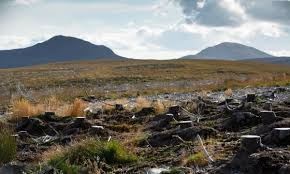Nature campaigners have reportedly called for taxpayers to take stakes in forest and peatland projects designed to store carbon, to avoid all the profits from carbon credits going to private investors.
A report from the Revive Coalition, which is an umbrella group for Scottish land reform and conservation charities, says carbon credits also need to be used much more effectively to bolster demand and help the UK meet its net zero targets.
Among other things, the report argues that current policies are failing to restore nature quickly enough: it notes that upland areas are so heavily degraded by overgrazing and deforestation that Scotland is one of the most nature-depleted countries in the world.
It said that the UK’s carbon market, which is heavily focused on voluntary and privately owned projects, needs to be better regulated and should also involve the UK’s state-owned banks, so profits can be shared fairly with the public.
Big companies, investment houses and pension funds use carbon credits, which pay for each tonne of CO2, which is stored by a forest or peat moor, to offset their own emissions and also to sell to investors.
Read also: Report: Nearly all of US states are facing droughts
This market helped propel a surge in land prices in the Scottish uplands and Highlands, with big firms such as BrewDog, Standard Life, Gresham House and Aviva buying estates to plant forests as carbon investments or to offset their own carbon emissions.
That has recently stalled, with investors unsure whether this market is financially attractive enough compared with other investments. Some believe that carbon offsetting projects in the UK are too small for major investors.
Only 124,000 hectares (306,000 acres) of land in the UK is taken up with woodlands and peatland registered with the woodland and peatland codes (with 103,300 ha of that in Scotland) – a fraction of the UK’s land mass.
Helen Armstrong, the report’s author, argues that these failures can be addressed by much greater public investment and by tougher regulations that push private companies into using nature-friendly carbon sequestration to reduce their emissions.
Her proposals chime with recommendations from the Scottish Land Commission, which published research this week on “shared governance” schemes involving land use in other countries.
These include Danish laws that say local communities must be offered 20% of the shares of windfarms; the co-ownership of the grid and renewable energy projects by German local councils; and the co-design of forestry policy in Finland involving local communities.
Story was adapted from the Guardian.
